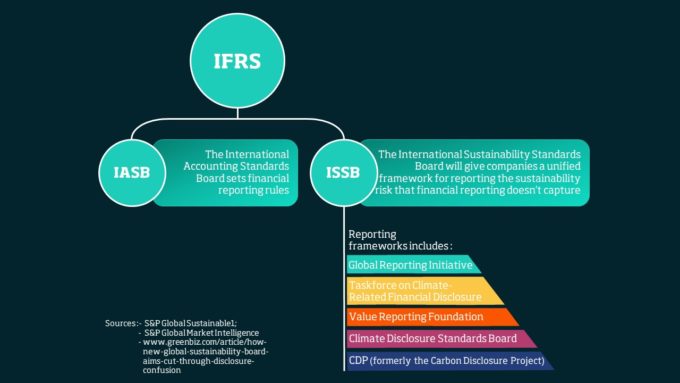
Digital sustainability: it pays to be a leader, not a laggard
Companies that excel in both digital and sustainable transformation attract a stock market premium, according to research. So, how do you tap into that value? ...

by Julia Binder, Salvatore Cantale, Vanina Farber, Knut Haanaes, Natalia Olynec, Karl Schmedders Published 15 November 2021 in Sustainability • 8 min read
Businesses need to accelerate actions to tackle climate change following the COP26 UN climate summit in Glasgow and are likely to face increasing scrutiny of their net-zero pledges and policies, according to IMD experts.
“COP26 is definitely a critical call to action for business. We can have different opinions on the negotiated outcome, but there is no reason to doubt that business has a role to play on climate,” said Knut Haanaes, Lundin Chair Professor of Sustainability.
COP26 participants made major commitments on cutting methane emissions, ending deforestation and shifting away from coal, despite disappointment over the last-minute watering down of the wording on fossil fuels in the summit declaration. There was also a deal on carbon market rules, but only limited progress on financial support for developing countries. While promises made in Glasgow were not enough to limit global warming to 1.5°C above pre-industrial levels, countries were urged to come back in 2022 with updated plans aligned with this goal.
And an unexpected US-China agreement on joint measures to tackle climate change offers some grounds for cautious optimism. “One major achievement of COP26 is that the world’s two largest economies and greenhouse gas emitters have pledged to work together to limit global temperature rise to 1.5°C. We are more likely to reach this goal if China and the US collaborate on regulations, new technologies and energy solutions,” said Natalia Olynec, Head of Sustainability at IMD.

And commitments made at COP26 will cascade down to businesses, not just because they are major direct emitters of CO2, but also because actions by consumers can only achieve 30% of the needed reductions in greenhouse gas emissions. Businesses therefore have a vital role to play alongside other players. “The importance of cross-sector collaboration on climate change cannot be emphasized enough. One set of stakeholders alone, whether business, regulators, or consumers, will not be able to shift the needle on climate change,” said Olynec.
Many companies have already made net-zero pledges of their own, but there are often doubts about the value of these if they are not backed by a clear roadmap that includes immediate action. “What are net-zero pledges worth without a very concrete understanding of how to achieve such good intentions?” asked Julia Binder, Professor of Sustainable Innovation and Business Transformation.
A recent survey by Swiss project developer and climate solutions provider South Pole found that 74% of companies have a net-zero target or are considering setting one, but that most involve target dates of 2040 or later, or no specific date at all. And South Pole’s analysis of a larger database of companies found a more limited level of net-zero commitments. “Even among large, listed companies, the urgency for action is lacking,” it said.
Setting a target too far into the future is a common error, says Karl Schmedders, Professor of Finance: “It is easy to promise net zero for 2050 without stating and quantifying serious steps for the next few years. We would expect companies to make easy progress at first, but that it will get more and more difficult later. So, making a promise and not showing immediate progress is meaningless greenwashing. Trustworthy net-zero promises must come with serious near-term and intermediate reduction targets.”
Long-term targets are sometimes also based on hopes for future technological progress that is far from certain. “Many net-zero promises rely on technical miracles in 2040 or later. For example, they rest on the assumption that carbon capture and sequestration will be affordable at a large scale. But will that be really possible? Most likely it would take huge amounts of energy to get large amounts of CO2 out of the atmosphere. Instead, ideally any promises should be based on existing technology and reasonable expectations for more modest technological progress,” said Schmedders. https://www.imd.org/LSBT/leading-sustainable-business-transformation/
74% of companies have a net-zero target or are considering setting one, but that most involve target dates of 2040 or later, or no specific date at all
Binder said that it is particularly concerning that most net-zero commitments are based on offsetting carbon emissions instead of strategies for transforming businesses towards more sustainability.
Schmedders said technological constraints and the very nature of their business will make it impossible for many firms to eliminate carbon emissions completely, so investments in offset measures such as tree planting have a role to play alongside strong mitigation efforts, but companies need to be honest about this.
Agreed standards for companies’ net-zero commitments and their contributions to liming global warming are vital to ensure that they are held to account and do not indulge in greenwashing, experts say.
“To move forward, we need standards to systematize net-zero commitments, including clear criteria related to cutting and not just offsetting emissions; and we absolutely need frameworks, strategies and best practices that support and inspire companies on their difficult journeys towards net zero,” said Binder.
The World Business Council for Sustainable Development took a clear step in this direction with its call at COP26 for the development of a new Corporate Determined Contributions (CDCs) to capture private sector progress in the global climate recovery.
The CDCs would be a new, common mechanism to assess business progress and delivery against climate action targets, alongside the Nationally Determined Contributions (NDCs) used to measure the impact of government commitments. “We are calling for the development of CDCs to ensure that business action is recognized and held to account in the global fight for climate recovery,” said Claire O’Neill, Senior Advisor for Climate & Energy at WBCSD.
Schmedders said the proposal looks really promising. “Companies must set near-term targets for the CDCs and then they must report on progress and whether they deliver what they promised. The timeline for these targets should be annual or biannual, and of course, all of this requires honest reporting,” he said.
Other standards are also being developed to ensure that statements on climate action have real substance.
Vanina Farber, elea Chair Professor of Social Innovation at IMD, said that one of the most promising developments in Glasgow was the IFRS Foundation’s announcement of the creation of the International Sustainability Standards Board to meet demand from investors for global rules for non-financial reporting. “The new sustainability standards will include detailed guidance on how environmental, social and governance reporting should be done by companies and other entities, providing guiderails and standards to facilitate the Just Transition,” she said.
The Science Based Targets initiative introduced the world’s first science-based standard for corporate net zero targets ahead of COP26. “Without standardization, it has steadily become clear that not all net-zero pledges are created equal,” said Emma Watson, Senior Manager for Net-Zero at the SBTi. Companies that adopt the SBTi Net-Zero Standard will have to set both near-term and long-term science-based targets aligned with keeping warming below 1.5°C, and SBTi announced at COP26 that 1,045 companies representing more than $23 trillion in market capitalization have already set 1.5°C-aligned science-based targets that will be measured against the standard.

As well as being rewarded for strong climate action policies, companies also risk being punished if they make empty promises. The United Nations is preparing to set up a greenwashing watchdog to name and shame companies that fail to deliver on net zero commitments. Secretary-General Antonio Guterres told COP26 the UN will create an expert panel to assess net-zero pledges due to concerns over “a deficit of credibility and a surplus of confusion” over emissions reductions. The panel will draw up rules for judging the net-zero commitments of what he called non-state actors, essentially businesses and financial institutions, with particular attention being paid to the use of carbon offsetting tools.
Nevertheless, many businesses are committed to serious action, and several strong commitments were announced by business groups in Glasgow. “Climate is the most important leadership challenge of our time, and good businesses are stepping up,” said Haanaes.
At COP26, former Bank of England governor Mark Carney said his Glasgow Financial Alliance for Net Zero now has $130 trillion of assets available to finance the transition to net zero; the Bezos Earth Fund, IKEA Foundation and Rockefeller Foundation forged an alliance with development finance organizations aimed at mobilising $100 billion for green energy projects in developing countries; and 28 companies from the mining, manufacturing and finance sectors pledged to grow supply and demand for green hydrogen.
However, Professor of Finance Salvatore Cantale says a COP26 pledge to end sales of fossil-fuel powered vehicles by 2040 struggled to win support. While the UK, Canada, the Netherlands and several regional and city governments signed the Glasgow Declaration on Zero Emission Cars and Vans, the US, China and Germany have so far declined to support the agreement. Among leading carmakers, Ford, General Motors and Volvo signed up, while Volkswagen, BMW and Toyota have not, but this is a reflection of a genuine dilemma facing vehicle manufacturers, said Cantale.
“With much uncertainty on the infrastructure that would allow the deployment of this goal and large difference on the speed and pace of change possible in different geographies, as a leader, would you rather commit to a goal that you have no idea whether or how you can achieve, or would you rather say no?” he said. “The stakes are high on both sides of the argument. On the one side there is the risk of being accused of greenwashing but also the opportunity to transform the organization towards a positive goal. On the other, there is the risk of being perceived as a naysayer or uncharismatic leader who lacks a transformational vision.”
Ultimately, though, all businesses will be forced to contribute to action to tackle climate change if they themselves are to avoid becoming obsolete. Businesses that do not do enough face growing transition risks from ever increasing regulation, liability lawsuits for environmental damage and pollution, innovations by competitors and changing investor sentiment, said Schmedders.

Professor of Sustainable innovation and Business Transformation at IMD
Julia Binder, Professor of Sustainable Innovation and Business Transformation, is a renowned thought leader recognized on the 2022 Thinkers50 Radar list for her work at the intersection of sustainability and innovation. As Director of IMD’s Center for Sustainable and Inclusive Business, Binder is dedicated to leveraging IMD’s diverse expertise on sustainability topics to guide business leaders in discovering innovative solutions to contemporary challenges. At IMD, Binder serves as Program Director for Creating Value in the Circular Economy and teaches in key open programs including the Advanced Management Program (AMP), Transition to Business Leadership (TBL), TransformTech (TT), and Leading Sustainable Business Transformation (LSBT). She is involved in the school’s EMBA and MBA programs, and contributes to IMD’s custom programs, crafting transformative learning journeys for clients globally.

Professor of Finance at IMD
Salvatore Cantale is Professor of Finance at IMD. His major research and consulting interests are in value creation, valuation, and the way in which corporations structure liabilities and choose financing options. Additionally, he is interested in the relation between finance and leadership, and in the leadership role of the finance function. He directs the Finance for Boards, Business Finance, and the Strategic Finance programs as well as the Driving Sustainability from the Boardroom program and the newly designed Bank Governance program.

elea Professor of Social Innovation, IMD
Vanina Farber is an economist and political scientist specializing in social innovation, sustainability, impact investment and sustainable finance with also almost 20 years of teaching, researching and consultancy experience, working with academic institutions, multinational corporations, and international organizations. She is the holder of the elea Chair for Social Innovation and the Program Director of IMD’s Executive MBA program and IMD’s Driving Innovative Finance for Impact program.

Lundin Chair Professor of Sustainability at IMD
Knut Haanaes is a former Dean of the Global Leadership Institute at the World Economic Forum. He was previously a Senior Partner at the Boston Consulting Group and founded their first sustainability practice. At IMD he teaches in many of the key programs, including the MBA, and is Co-Director of the Leading Sustainable Business Transformation program (LSBT) and the Driving Sustainability from the Boardroom (DSB) program. His research interests are related to strategy, digital transformation, and sustainability.

Chief Sustainability Officer at IMD
Natalia is the Chief Sustainability Officer at IMD. She designs and implements sustainability strategy, develops executive education programs and advisory, publishes research, builds cross-sector partnerships, and communicates IMD’s ambitions and progress. The Center for Sustainable and Inclusive Business, co-led by Olynec, aims to support leaders and companies to take steps towards a more sustainable and inclusive business world by harnessing IMD’s knowledge and expertise in the area and offering tools to help them deliver systemic, innovative, and impactful responses.

Professor of Finance at IMD
Karl Schmedders is Professor of Finance at IMD. In his research, he applies numerical solution techniques to complex economic and financial models, shedding light on relevant market issues and industry problems. He is also Director of IMD’s new online certification course for structured investment products in partnership with Swiss company Leonteq, teaches in the Advanced Management Concepts (AMC) and Executive MBA programs, and is an advisor on International Consulting Projects in the MBA program.

17 July 2024 • by Michael R. Wade, Evangelos Syrigos in Sustainability
Companies that excel in both digital and sustainable transformation attract a stock market premium, according to research. So, how do you tap into that value? ...

11 July 2024 • by Stéphane J. G. Girod in Sustainability
A series of watershed events forced CHANEL out of its comfort zone, culminating in the launch of CHANEL Mission 1.5°. With this new strategy, the luxury fashion house embarked on a journey...

5 July 2024 • by Avni Shah in Sustainability
Creative industries have a key role to play in creating positive social change. Here are six key insights to help them achieve their goals. ...

3 July 2024 • by Richard Baldwin, Salvatore Cantale in Sustainability
The EU Corporate Sustainability Reporting Directive (CSRD) will impose comprehensive and standardized sustainability reporting responsibilities on firms, adding unprecedented complexity to mergers and acquisitions. ...
Explore first person business intelligence from top minds curated for a global executive audience